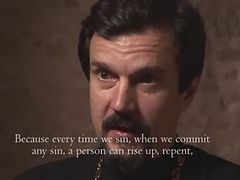A very poignant question was sent privately to me after my last post. It asked how I was able to go about my parish work when I was battling with depression and anxiety. I have pondered the question over the past week. On one level, I felt a sense of personal astonishment that, in hindsight, it had all been possible. There were very few days through the decades where I was unable to get on with things. So, what did I do? Or, perhaps better, what did God do?
At some point in my life, I began to think of the depression and anxiety much like a broken leg or a sore throat. We never say, “I am a broken leg, or I am a sore throat.” But when we are anxious or depressed we say, “I am depressed, I am anxious.” Strangely, it makes a difference. It is certainly the case that having a broken leg can interfere with any number of activities. It could cause enough pain that medication and rest would be required. Depression and anxiety are no different.
To my mind, it’s possible to be “depressed” about being “depressed.” And this leads to a terrible paralysis. Spiritually we begin to agree with our adversary. Not only do we suffer the pain of such a feeling but we have to tolerate his taunts of “look how depressed you are! What kind of a Christian are you? Give up! Quit!” and the like. He is a liar. I often thought that it was important to act in a manner that contradicted the depression and anxiety simply to infuriate our adversary. There is some joy in ruining his day.
I am describing certain aspects of my inner life that I can only speak to for myself. I do not know if these strategies would be of help to anyone else. I have often thought of others who carry very debilitating chronic diseases and think that my own struggles are quite minor by comparison. I have developed a strong interest in the stories of those who endured the Gulag and the other prisons of our time. Nothing in my life begins to compare to even the shadow of their ordeals. This was not a practice that “cheered me up.” Rather, it was a practice that encouraged me to be patient, ask for their prayers, and, as much as possible, to ignore the inconvenience of my brain.
Parish work is blessedly composed largely of two things: pastoral care for others and prayer in the altar before God. Both are salutary and of deep benefit. I think there were many times that my prayer life was reduced to little more than “arrow prayers” through the day (“God help me!” Lord, have mercy!” “Glory to God for all things!” etc.) and the blessing of liturgical prayer in the altar. There have certainly been many times that, standing in the altar, I could not “feel” anything of which I spoke. But I prayed quietly that God would receive it as though I did.
And all of this has been within God’s mercy. He has sustained me. I prefer not to share the worst of my days and my failings – those belong to my confessor and are well-enough known to those immediately around me. I am convinced, however, of the goodness of God. Much of that conviction, for many years, was rooted in the examples I saw in the lives of other people because I could not see it in mine. I see it more clearly now, I think, partly as a function of getting older. There’s enough scenery in my rear-view mirror that I can now see the unmistakable pattern of divine goodness. One strategy against depression and anxiety is to outlive it!
The Elder Thaddeus spoke about profound changes in his own life that came with a true acceptance of Divine providence. To some small degree that has been part of my own experience. There is a strong physical component in depression and anxiety, but there is an equally strong component of self-talk and habits of thought. Extended meditation and confession of God’s good work in all things has served, especially over the past few years, to calm my soul and preserve my joy. All of the things that cause anxiety or are objects of depression simply do not matter. They are of no consequence in the last analysis.
Four years ago, I had a heart attack. As such things go, it was minor, but certainly served as a mortality check-up. St. Paul said that we should “reckon ourselves dead to sin.” I reckoned myself dead to everything and came to the conclusion that it would be fine. My life has been deeply blessed. Everyone, everywhere, every day, is living on “borrowed” time. Every moment is a gift. If we give thanks for the gift, then we can begin to know that the Giver who has sustained us this far will also give us what we cannot see – a new life in a new world in the depth of union with Him. Of course, writing the blog would be more difficult!








